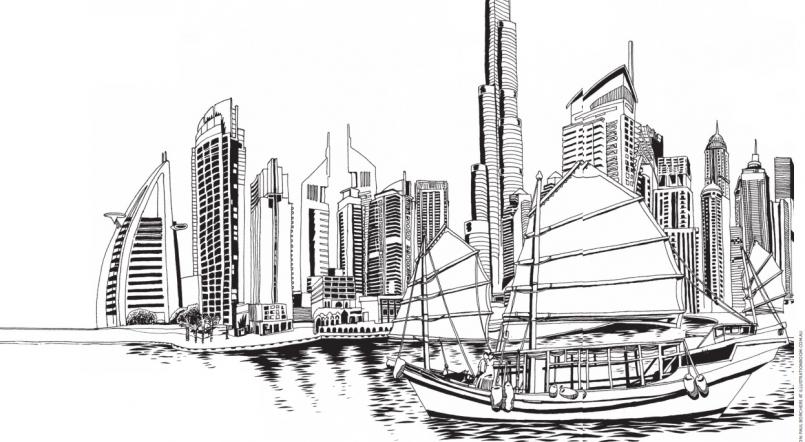The Gulf Cooperation Council (GCC) was formed in 1981 due to the regional insecurity the Gulf States faced from the Iran-Iraq conflict. The six member states of the GCC – Kuwait, Saudi Arabia, Bahrain, the United Arab Emirates, Qatar and Oman – share many commonalities. All are oil-producing monarchies that follow generally open economic policies.
Historically, the Gulf region also shared strong cultural and trade ties with Asia dating back to the days of the Silk Road. These interlinking, cross-continent trade routes saw merchants from the Arab world and Asia travel overland or sail their dhows and junks to trade commodities including spices, textiles, china and silk.
East-East business movement
While the relationship between the Gulf and Asia has evolved, trade and labour exchanges in modern times date back to the 1980s. For example, South Korean construction companies, including Hyundai Engineering Company, KCC Engineering and Construction Corporation and Samsung C&T Corporation, built much-needed infrastructure across the GCC.
More recently, GCC countries have looked to forge stronger economic ties across Asia. Saudi Arabia’s King Abdullah Bin Abdul Aziz Al Saud visited China, Malaysia and India soon after he ascended to the throne in 2005. This April, during the meeting of the Asian Cooperative Dialogue, Kuwait recommended establishing a fund for Asian development, of which the emirate would contribute US$300 million out of the total fund of US$2 billion.
The bloc’s relationship with China has also developed significantly. The Kuwait Petroleum Corporation and China’s Sinopec are jointly building a US$9.3 billion refining and petrochemical complex in Guangdong. Likewise, Saudi oil company Aramco has signed a joint venture agreement with Sinopec to build and operate an oil refinery in the Saudi Red Sea port of Yanbu.
There is a long history of business and cultural exchanges between the GCC countries and India. Citizens from the GCC have been going to India to study for years and Indian education plays a very strong role in the Gulf States, with many Indian educational institutes being set up there.
In Kuwait, both the Indian private sector, including engineering and construction group Punj Lloyd and IT company Tata Consultancy Services, and government-owned corporations, such as India’s largest insurance group Life Corporation of India and India’s national carrier Air India, have a strong presence. In 2006, Kuwait’s Emir Sheikh Sabah Al Ahmad Al Sabah personally visited India to forge stronger security and trade relations.
The states of the GCC and Asia have strong cultural and economic exchanges, and the size and scope of this relationship will only grow during the current decade.
Trade, investment and the Arab Spring
The Arab Spring is unlikely to impact trade between Asia and the Middle East. For many Asian countries, it could even be an opportunity. Many Middle Eastern countries – particularly Iraq, Syria and Egypt – will require infrastructural development as they rebuild. The Middle East is passing through a transformative era seen in Latin America and Eastern Europe in the past – expect a series of socio-economic and political changes and upheavals.
It is important to distinguish between the revolutions seen in the Arab world, with the reform movements in the GCC countries. The Arab Spring is a movement that involves assertiveness, participation and partnership between populations against their governments. However, citizens in the GCC countries want reforms and political systems that are more responsive, more egalitarian and open to individual rights.
GCC citizens are loyal to their existing political regimes, but the grassroots political movements in several countries, including Kuwait, Bahrain and Saudi Arabia, are calling for change and a working agenda towards democratisation and reform.
Security dynamics
The West has been a strategic security partner for the Gulf since the British withdrew from the region in the late-1960s. This is unlikely to change, but a stronger security relationship is being formed with the East. Regional insecurities, piracy and securing access to energy supply routes have seen increased strategic linkages between Asia and the Middle East. India in particular has strengthened security ties, signing defence cooperation agreements with both Qatar and Oman on maritime security.
Oil alternatives
One of the motivations driving reforms in the GCC countries is an understanding that oil is a finite resource. There is fear and uncertainty on how to diversify and create the needed partnership between a more representative government and the people. Yet, the region’s elites understand the limitations of the oil boom and realise they must diversify to survive in partnership with the people.
Stronger collaborations
I am confident that the Middle East’s collaboration and partnership with Asia will continue to evolve. We live in a highly globalised, inter-connected world and there will be lot more scope to do business as Asian economies integrate further. Links between the two regions go back hundreds of years and with exchanges multiplying, the modern-day Silk Road will only get stronger.
This article was first published in HQ Asia (Print) Issue 06 (2013)


